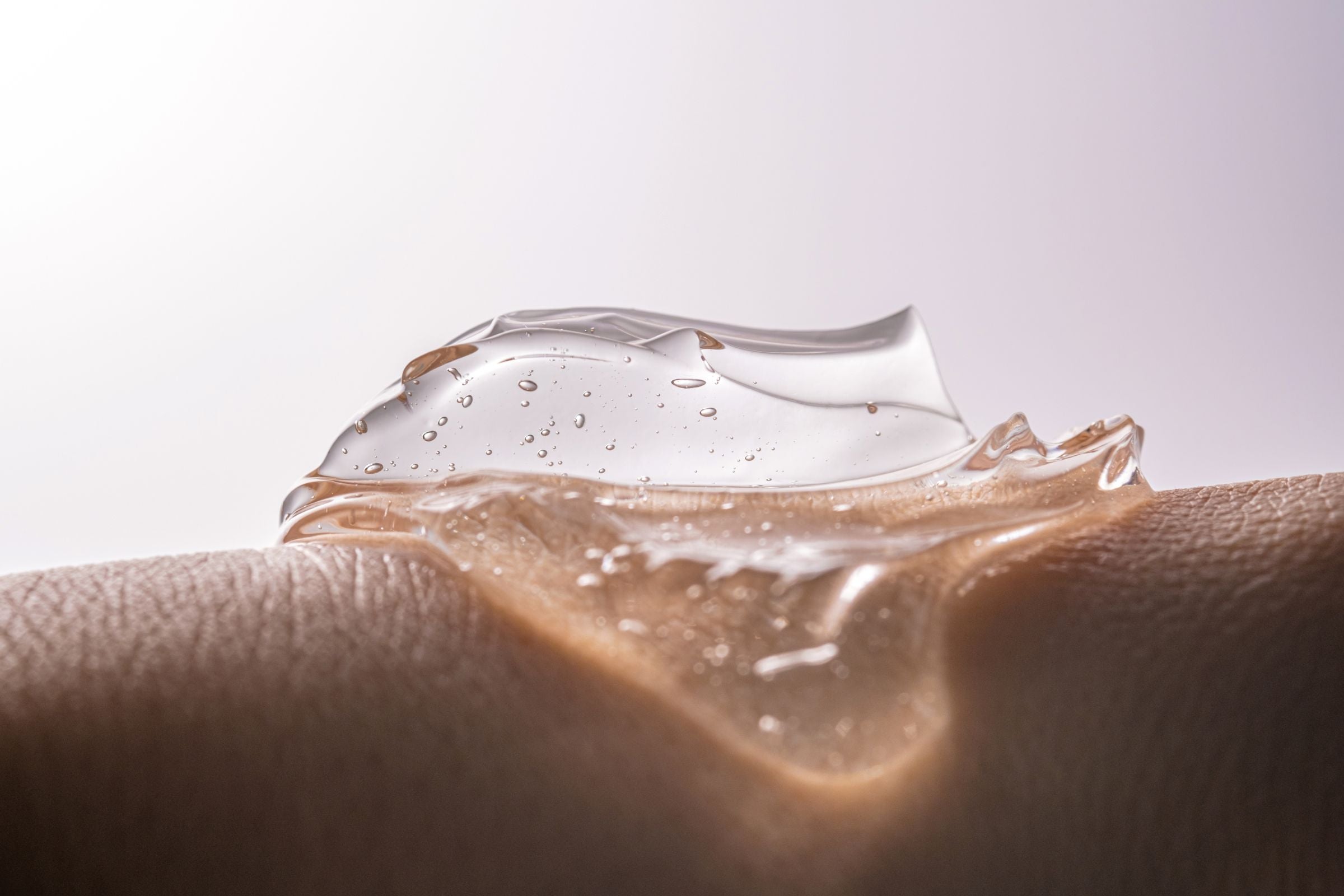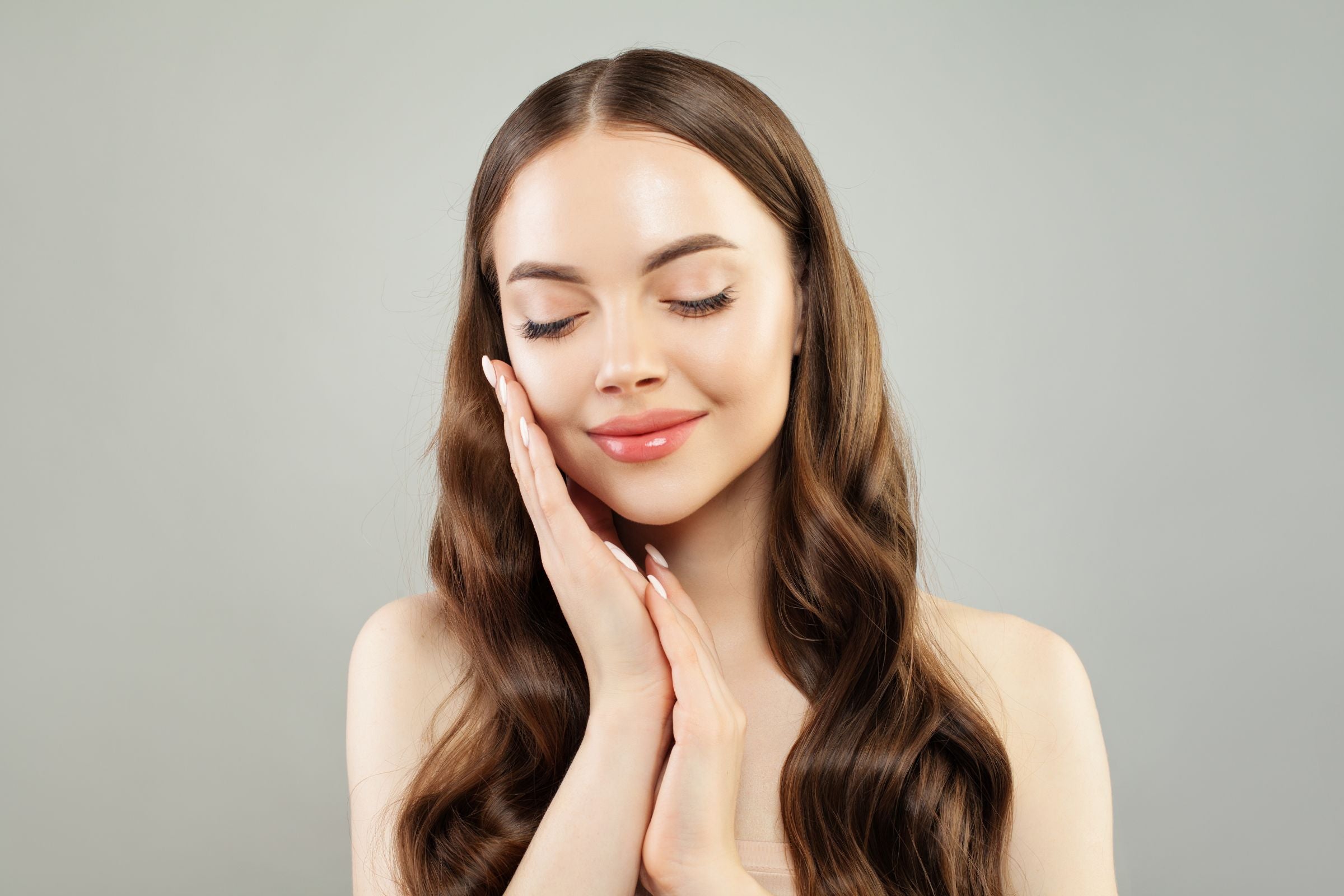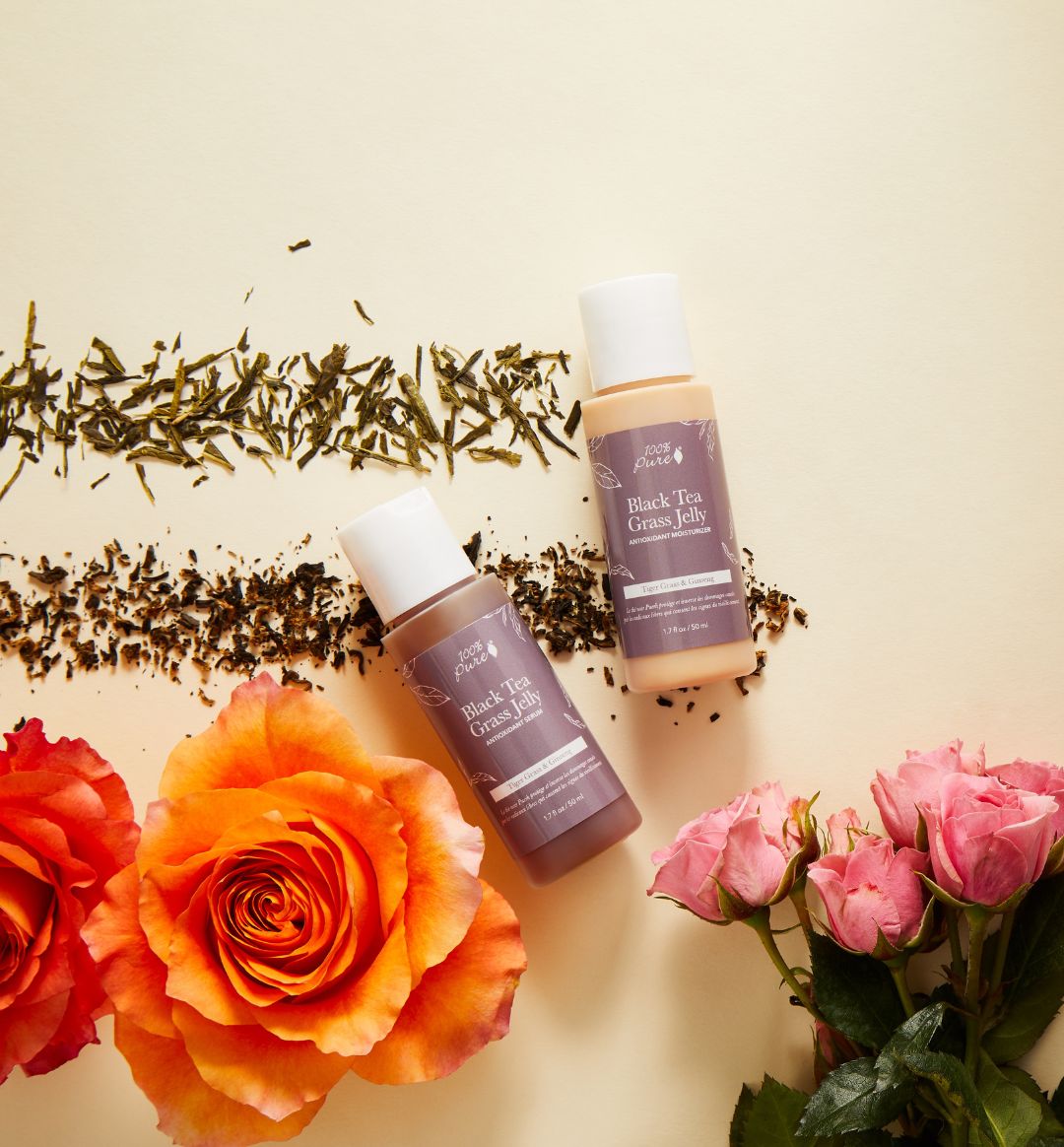Get Ready to Plump Up the Volume!
Written by: 100% PURE®
By now, we’re all pretty well versed in hyaluronic acid and the hydration halo it carries for quenching and plumping the skin. Let’s just say another ingredient with a crown of light has skyrocketed to holy grail status in the skincare universe. Alas, polyglutamic acid! And it has made its way down into some of the most heavenly natural skin products.
Call it hyaluronic acid’s super-charged sibling, polyglutamic acid is a saint at holding more water in your skin and giving an overall moisturized, plumper, and rejuvenated complexion. While we have praised hyaluronic acid to the skies, it doesn’t mean it’s going to give its seat up to polyglutamic acid.
There are times when one acid might be preferred over the other. Let’s reveal more about the enigma that is polyglutamic acid, its skincare virtues and comparisons with hyaluronic acid, and the best products that feature this pint-sized ray of light.
Before we can delve into why polyglutamic acid is having its time in the spotlight, there’s one burning question that needs to be addressed - and we aren’t going to keep anyone in suspense. Precisely what is polyglutamic acid? Simply breaking it down, “glutamic acid” is an amino acid.
Amino acids combine to form proteins, which are the building blocks of skin (and life), including mostly, collagen, one of the most essential materials in our skin. Glutamic acid aids in hydrating and conditioning the skin. Polyglutamic acid is created when lots or “poly” of glutamic acid molecules are linked together.
So, that should (hopefully) make the ultra-sciency ingredient a little clearer and friendlier for skincare enthusiasts. Polyglutamic acid is found in natto, a traditional Japanese dish made from fermented soybeans.
Polyglutamic acid is a humectant skincare ingredient. A humectant is designed to address skin hydration by not only preserving the existing moisture in the skin and diminishing escaping moisture but also by drawing moisture from the environment to keep the skin hydrated longer. Skin hydration is one of the keys to smooth, supple, and ageless skin.
What puts polyglutamic acid in skin superstardom among a host of other skin hydration all-stars? Many of us are comfortable turning to the well-loved hyaluronic acid when our skin needs a hydration boost, so how does this ingredient differ? Quite similar to hyaluronic acid, polyglutamic acid is shown to be a supercharged version of this popular skincare ingredient.
How supernova? Polyglutamic acid holds four times more moisture than hyaluronic acid! How’s that for a tall drink of moisture?! One of the main reasons we’d snatch polyglutamic acid over another common humectant like hyaluronic acid is simply that it is shown to be way more hydrating. For dry or sensitive skin types, or those suffering side effects of skin and acne treatments, a hydration powerhouse like this is a game changer – and why it would be preferred over hyaluronic acid.
Another reason polyglutamic acid makes such a difference with skincare is the textural repair we can achieve with this ingredient. One of the main benefits of polyglutamic acid comes from diminishing skin texture, like the appearance of pores, scars, and fine lines. Polyglutamic acid helps to blur away that texture, or plump up pitted scars and restore elasticity for smoother, more supple and dewy, bouncy skin.
Finally, the most critical differentiator between polyglutamic acid and its smaller hydrating sibling, is that while hyaluronic acid is effective for skin hydration, it’s already native to the dermis and skin cell structure. Hyaluronic acid naturally occurs in the body, and it can also be used in skincare from a supplementary standpoint.
But when we add polyglutamic acid to our skincare routine, we’re giving our skin a benefit that it wouldn’t have access to naturally. Due to polyglutamic acid’s larger molecular size than hyaluronic acid, it can penetrate the skin’s upper layers for multi-level hydration. Because it has a greater capacity for hydration than HA, it simply takes first place in our hydration arsenal.

If this hydration hero wore a cape, its superstar powers would be its stellar ability to hydrate skin and its impressive absorption properties. Why is hydration for all skin types SO important? As we mentioned, skin hydration is essential for healthy skin; we might even argue that it is the most important aspect of skincare.
We know that when the skin is dry and struggling to achieve hydration, those little skin cracks and crevices leave us at risk for a host of skin irritations. On the skin type flip side, if skin is oily and having a hard time staying balanced, we’re at risk for clogged pores, breakouts, and acne. In a skin shell, hydration is our first line of defense against anything - from the environment to bacteria!
Beyond breakouts and rashes, skin that isn’t properly hydrated is more likely to show signs of aging. As this skin hydration acid rejuvenates the skin, it helps to diminish the appearance of enlarged pores, fine lines, and general skin texture, as well as helps revive the skin’s natural bounce and glow.
As a humectant, polyglutamic acid doesn’t just keep the skin looking plump and dewy; it also keeps the skin protected. Not only does it draw water into the cells, but it also forms a protective film on your skin that prevents water from evaporating. Beyond that, polyglutamic acid is one of the best options when it comes to safety and stability for all skin types, especially sensitive skin.
We love finding skincare ingredients to support our sensitive skin folks, and polyglutamic acid is an option that - for the most part - works for everyone. We can’t see why anyone of any skin type would want to miss out on the fun with this ingredient. So, let’s learn how to incorporate this super hydrator into the dream team of natural skincare products.
Step one: Cleanse your skin, then apply toner.
Step two: Next, apply an antioxidant serum with polyglutamic acid, and allow its heavenly moisture to reach those deeper levels of your skin.
Step three: Next, apply moisturizer with polyglutamic acid for even higher hydration levels and to lock all the moisture goodness in.
Step four: Sun protection should be used every day – especially if acids are included in your routine. It should always go on last. The only thing you should layer over sunscreen is powder, concealer, or foundation.
Here are some tips for working with this ingredient.
Tip #1: Polyglutamic acid is mild enough to be used morning, night, or both morning and evening. For normal, combination, and oily skin types, this product may be best applied for overnight skin rehydration and skin repair.
Tip #2: Best applied in a serum, essence, or moisturizer, polyglutamic acid is best delivered in between the serum and moisturizing steps of any routine.
Tip #3: While it pairs well with a host of other power players - such as retinol, vitamin C, and niacinamide - it’s best to limit the active ingredients on the skin to reduce the risk of irritation.
Tip #4: Dry skin, recovering skin, mature skin, and acneic skin types can truly benefit the most from this incredible ingredient.
PRO-TIP: We always recommend testing with a patch test but even so, this mild and gentle ingredient is so hard at work helping to instill mega hydration that the risk of irritation is practically little to none.
Newsletter Subscribe
for more blog updates and exclusive discounts

Now that we’ve discussed how polyglutamic acid benefits the skin and how to use it, let’s talk about where you can find it! We’re over the moon and stars with our polyglutamic acid! It’s uniquely vegan and is made from natto beans!
Natto contains lecithin, which is a skin softening, conditioning, and smoothing agent, as well as vitamin E, which is a powerful antioxidant and helps to prevent skin damage from free radicals, keeping your skin looking bright, young, and healthy.
Here are a few of the best skincare products featuring polyglutamic acid!
This hydrating face toner is filled with skin-loving nutrients that your dermis will drink up. It features optimum hydration thanks to undiluted floral hydrosols like rose, calendula, and witch hazel to calm and clarify skin for a healthy glow. The addition of hyaluronic acid quenches thirsty skin cells, while polyglutamic acid from natto beans delivers extra hydration to the skin’s surface and underneath layers. Let nature revitalize your skin and unlock its full potential.
Black Tea Grass Jelly Anti-oxidant Serum
Boost skin's defense against free radicals and aging with our concentrated antioxidant serum. Infused with Puerh black tea leaves, this formula plumps and firms your skin while efficiently absorbing it to hydrate and nourish it. Experience the perfect base for flawless makeup application as you indulge in the ultimate skin protection and nourishment.
Black Tea Grass Jelly Anti-oxidant Moisturizer
This moisturizer features Black Tea and Grass Jelly to soothe the skin and provide strong protection against free radicals. With its deep-penetrating formula, it effectively fights signs of aging by delivering intense hydration. The concentrated antioxidants found in Puerh black tea shield the skin from damage caused by free radicals, similar to how sunblock protects against the sun.
Watermelon Cucumber Water Locking Serum
They say three is a crowd, but they haven’t met our watermelon-cucumber trio! Our intensely hydrating hydrogel serum locks in watermelon hydrosol to revitalize dehydrated skin cells with skin-plumping polyglutamic acid from fermented natto beans and moisture-retaining hyaluronic acid. It also contains plant-based rice ceramide to help restore your skin's protective barrier function by reinforcing its lipid content.
Watermelon Cucumber Water Locking Moisturizer
Our long-lasting moisturizer hydrates, plumps, rejuvenates, and smooths skin with watermelon hydrosol and cucumber waters, hyaluronic acid (from sweet potatoes), and polyglutamic acids (from natto beans). This face dream cream helps to promote cell regeneration and lessen the signs of aging with moisture-locking Irish Moss Extract, plus antioxidant olive squalane to provide long-lasting hydration without a greasy feel.
Watermelon Cucumber Water Locking Mist
Finishing off this trio, our ultra-hydrating water mist naturally reinvigorates dehydrated skin cells and reduces the signs of aging by locking in cactus juice, watermelon hydrosol, and hyaluronic acid to quench and plump skin. The addition of olive squalene helps repair dry, rough skin by moisturizing and softening it, while also soothing redness or irritation caused by sensitive skin. It leaves you with a moisturized yet non-greasy feel - perfect for everyday use!
Can PGA be used with other active ingredients?
While it pairs well with a host of other active ingredients, like retinol, vitamin C, and niacinamide, it’s best to incorporate one active at a time until your skin is accustomed to it, especially if you have super-dry skin or sensitive skin to reduce the risk of irritation.
How quickly can I expect to see results from using PGA?
With consistent application, you can expect to see results, such as a boost in glow and hydration, as early as to weeks, with improvements in skin texture and tone the longer you use it.
Are there any potential side effects or risks associated with PGA?
One of polyglutamic acid’s stellar properties is its ability to hydrate and soothe sensitive skin types. That makes it generally safe to use on any skin type. Of course, it’s always a good idea to patch test if you have very dry skin or super skin sensitivities.
Can PGA be used on sensitive skin?
Polyglutamic acid is similar in profile to other humectants like hyaluronic acid, meaning it's best for dehydrated skin but can benefit all complexions. It's gentle - so even sensitive skin can enjoy it without fear of irritation or redness.
Does PGA replace the need for a moisturizer?
No. You will still need to follow up with a moisturizer and one that contains SPF!
Let’s just say the stars aligned when polyglutamic acid emerged on the skincare scene. With the treasure trove of benefits, such as its superior hydration powers and trapping essential moisture in the skin for the ultimate dewy complexion, your skin should be glowing and moist in no time!
Regardless of whether you’re dealing with dry skin, oily skin, or combination skin, polyglutamic acid will take your complexion to the next level. It’s a true skincare gem for a balanced and healthy complexion you’ve always dreamed about – and can now have! Now, you can thank your lucky stars.
- Tags: August-2023, Skin Care, skincare
We carefully hand-select products based on strict purity standards, and only recommend products we feel meet this criteria. 100% PURE™ may earn a small commission for products purchased through affiliate links.
The information in this article is for educational use, and not intended to substitute professional medical advice, diagnosis, or treatment and should not be used as such.








